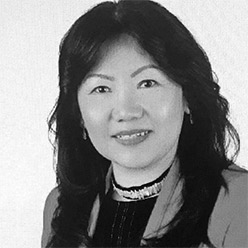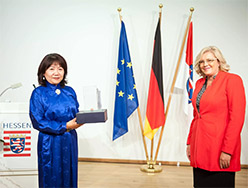
Oyuna Bold

The European International Women’s Leadership Award 2021
Oyuna Bold and MEP Corina Cretu, Former EU Regional Policy Commissioner
Photo: European International Women’s Leadership Award 2021 and Hesse EU Office


Oyuna
Bold
Born
as the daughter of the most famous female singer in Mongolia, Oyuna
Bold (Oyunna Bold) studied engineering at the Moscow State University
of Food
Production Technologies, graduated and – when the Soviet Union
disappeared – returned to her home country at a time when everything
was changing: instead of one-party rule and planned economy, suddenly
democracy and market economy – instead of a future, which seems to be
determined in advance, she was now confronted with a panoply, a broad
diversity of options of promising and/or threatening and/or fascinating
and/or incredible ways in front of her.
Open to everything – and as well with the feeling of being a little bit
lost – she decided to become a translator and interpreter and worked
for the Czechoslovakia embassy – but that country disappeared as well
and the embassy closed.
For a moment, she even developed the feeling to have a negative
influence – as with whatever country she was linked to, that country
broke up into pieces.
Remembering the artistic background of her family, she accepted to
accompany a Mongolian music group to Italy, the Netherlands and
Belgium. Fascinated by the intellectual openness in Europe and by the
directness of contacts, she decided to stay in Belgium. As an Asian
woman she discovered with admiration a society in which women are
emancipated. A society that offers them so many opportunities to
develop, learn and flourish. She immediately wanted to reach out to
others, to take an interest in Belgium’s culture, history, political
and economic situation and to invest herself in it.
As the concept of the European Union “solidarity in diversity” seemed
the model for the/her future, she decided to settle down in Brussels
and sustained herself as a cleaning woman. When she discovered that her
cyrillic-written university diploma was the equivalent of a Masters
degree, she asked for a homologation – so new job opportunities
opened-up (where she managed to develop certain skills – especially
professional consciousness and sense of responsibility).
She worked at the British School in Tervuren, for an energy consulting
company and finally (up to now) in the cabinets of six Belgian
Ministers – by this becoming the first Asian-born person, having worked
for such a long time in those inner circles of executive power in
Belgium.
At the same time, she never forgot where she came from. So a few years
ago, she created the Mongolian Cultural Center in Belgium. Within the
framework of her diverse non-profit activities, she organised
exhibitions of Mongolian painters, and looked after the internationally
highly decorated Mongolian national archery team (one of the preferred
Mongolian sports) during their stay in Belgium. Overall, she
made it possible that we here have the possibility to learn more about
Mongolian culture.
As her personal concept is to be grateful to one’s roots, she uses her
diverse and broad contacts in Europe for years to organise humanitarian
emergency campaigns for socially deprived people in her country of
origin.
She receives this award especially for her determination to never give
up and for her principle that the higher you move up in the social
hierarchy, the more you have to be a – proud and humble – servant of
your people.
More
info: http://filf-iwlf.com/?page_id=3314
February 13, 2022
Video by @ Hessen in Berlin und Europa. full video: https://youtu.be/VLJ8j3HaDwU